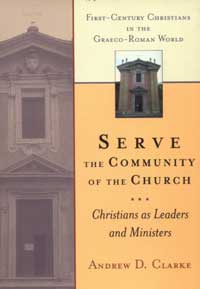There’s an interesting conversation going on at Signposts, sparked by a post by Canadian Leighton LeBay reviewing John Bevere’s model of APEPT in charismatic churches at TheHeresy.com.
Alan Hirsch, in Leighton’s comments, restates his belief that at least a five-fold ministry model is prescribed by the Ephesians 4 passage. This is consistent with Alan’s approach in the book, The Shaping of Things to Come (of which I bought 15 copies today!)
Dan of Signposts in Melbourne wonders if the focus on ‘apostolic leadership’ may have negative consequences for the church as a whole. She makes a link with her earlier questions on women in leadership.
Steve Taylor, Emergent Kiwi, comments that the APEPT model is one of the more problematic things he’s come across in the emerging church conversation. He says that one small section of Ephesians is not enough to build a prescriptive model of leadership for the New Testament churches let alone the 21st Century churches in all their diversity. I agree.
 Steve refers to Andrew Clarke’s “Serve the Community of the Church: Christians as Leaders and Ministers“. Clarke examines leadership in the Graeco-Roman society, at city, voluntary associations, family, household, and Jewish synagogues. Clarke takes us through the many models of leadership found in the New Testament. Corinth was a community wavering between being boastful of its leaders and being divided over them. The church in Rome was a community of leaders preoccupied with status. The church in Philippi was a church preoccupied with politics. Leadership outlined in Pauline writing was in fact a response to the socio-economic settings of each city.
Steve refers to Andrew Clarke’s “Serve the Community of the Church: Christians as Leaders and Ministers“. Clarke examines leadership in the Graeco-Roman society, at city, voluntary associations, family, household, and Jewish synagogues. Clarke takes us through the many models of leadership found in the New Testament. Corinth was a community wavering between being boastful of its leaders and being divided over them. The church in Rome was a community of leaders preoccupied with status. The church in Philippi was a church preoccupied with politics. Leadership outlined in Pauline writing was in fact a response to the socio-economic settings of each city.
I think we need to commission and welcome people with leadership that goes beyond the local congregation. Obviously I’m biased as my role as mission consultant includes aspects of apostolic and prophetic ministry. But I would be very very reluctant to limit leadership roles to the Apostle, Prophet, Evangelist, Pastor and Teacher brackets. I’m with Steve Taylor on this. I’m sure we need to move out of a dependence on ‘clergy’. But we also need to recognise the huge varieties of leadership styles and frameworks God uses in churches around the world.
Homer Paxton, internet troll extraordinaire, asks in Dan’s comments how apostles and prophets get to be chosen. My response…
From the evidence of The Didache the early church found it difficult to work out which prophets and apostles were to be recognised. Just like now, there was no shortage of people who made a living out of travelling around with the message of the Lord. Many were genuine. Some were spongers. And so the paragraph quoted here from the Didache:
“Concerning the apostles and prophets, so do according to the ordinance of the Gospel. Let every apostle, when he comes to you, be received as the Lord; but he shall not abide more than a single day, or if there be need, a second day. If he abides three days, he is a false prophet. When he departs let the apostle receive nothing except bread, until he finds shelter; but if he ask for money, he is a false prophet.”
Excerpted from: http://www.antioch.com.sg
The Didache was probably written either late first century or early second century.

i don’t think homer is a troll, I think lance is though, for sure. A bitter one a that.